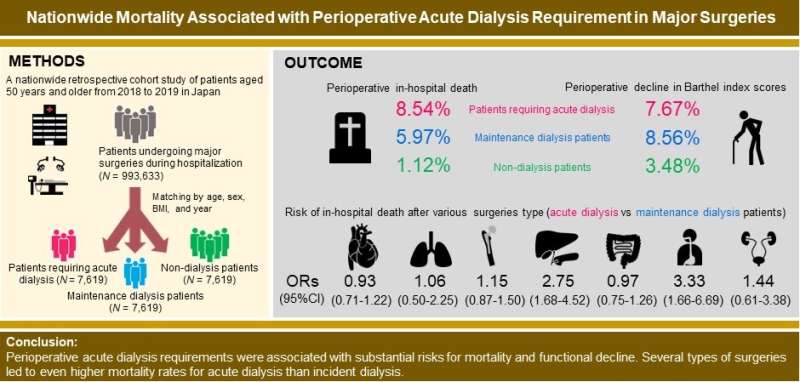Urgent dialysis during hospitalization for surgery predicts poor outcomes

Even the best-laid plans often go awry, and adapting to changing circumstances on the fly can lead to unanticipated results. Now, researchers from Japan report that dealing with unexpected problems during surgery can also affect patient outcomes.
In a study published in August in International Journal of Surgery, researchers from Tokyo Medical and Dental University (TMDU) have revealed that emergency dialysis during hospitalization for surgery has important implications for post-surgical outcomes.
Kidney disease represents a major risk for complications during surgery, sometimes even leading to death. In some cases, patients with poor kidney function require emergency dialysis prior or subsequent to a surgical procedure, but it is unclear how this affects the risk of functional decline or death after surgery.
"We suspected that patients with impaired kidney function who received urgent dialysis during hospitalization for surgery would have unfavorable outcomes," says Assistant Professor Shintaro Mandai, senior author of the study. "We were also interested in discovering whether the impact of acute dialysis on patient outcomes varied depending on the type of surgery."
To investigate this, the researchers analyzed data from patients admitted to Japanese hospitals from 2018 to 2019. They specifically looked for connections among type of surgery, type of dialysis, and surgical outcomes.
"The results showed that mortality rates were significantly higher in patients who received acute dialysis," states Professor Rai Tatemitsu, senior author of the study. "In particular, mortality rates after the two categories of surgical procedures, hepatic lobectomy/cholecystectomy/pancreatectomy and esophagectomy/gastrectomy, were markedly higher when patients needed acute dialysis than when they were already dependent on maintenance dialysis at admission."
Further analysis showed that having trouble with daily activities such as bathing and grooming prior to surgery was strongly associated with death after surgery. Heart surgery, colorectal resection, and esophagectomy/gastrectomy in particular led to higher mortality, while patients who survived heart surgery and orthopedic surgery were more likely to develop functional challenges after the procedure.
"Our findings demonstrate that patients who undergo post-operative acute dialysis are at much higher risk of mortality than patients on maintenance dialysis," explains Professor Shinichi Uchida, senior author on the study. "Furthermore, mortality risk was not increased with a pre-operative dialysis for any surgical procedure."
These findings suggest that performing dialysis ahead of time for patients with impaired kidney function could enhance the rate of survival, especially after high-risk surgeries. In addition, given that patients who struggled to carry out daily activities prior to surgery were also at increased risk of death, improving patients' functional status before surgery could also help improve outcomes.
More information: Yuta Nakano et al, Nationwide mortality associated with perioperative acute dialysis requirement in major surgeries, International Journal of Surgery (2022). DOI: 10.1016/j.ijsu.2022.106816



















